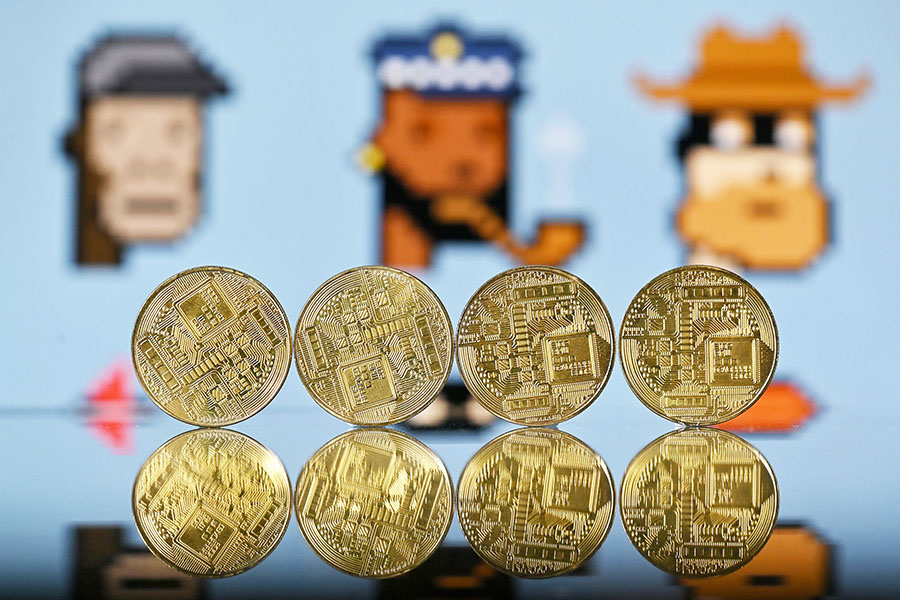 69,795 of the 73,257 NFT collections analyzed by DappGambl today have a market capitalization of… 0 ethereum.
69,795 of the 73,257 NFT collections analyzed by DappGambl today have a market capitalization of… 0 ethereum.
Image: Justin Tallis / AFP©
It wasn’t so long ago that NFTs were being heralded as a mini revolution in the worlds of art and finance and were regularly being snapped up for record sums. But the market for NFTs—blockchain-backed certificates of digital ownership—has been steadily plummeting in recent months. So much so that most of these non-fungible tokens now have virtually zero value, according to a recent study.
The report in question was carried out by crypto and Web 3.0 review platform DappGambl, which analyzed 73,257 NFT collections. The report reveals that the current moment of is one of disillusionment for holders of these once coveted assets. The NFT craze dates back to March 2021, when a work by digital artist Beeple, entitled “Everydays: the first 5000 days,” sold for a staggering $69.3 million at Christie’s. That was the moment when the whole world—or so it seemed—fell in love with these digital objects, whose value lies in just a few lines of code.
However, two years on, the vast majority of NFTs are no longer of great financial interest. In detail, 69,795 of the 73,257 NFT collections analyzed today have a market capitalization of… 0 ethereum. This means that 95% of NFTs no longer earn a cent for their owners. A vertiginous collapse for digital objects that brought in no less than $44.2 billion in 2021, according to estimates by the ChainAnalysis website.
Even iconic NFT collections, such as Bored Apes Yacht Club and CryptoPunks, have not been spared from this massive phenomenon of devaluation. The non-fungible tokens making up these collections are now trading at historically low levels, whereas just a few years ago they could be worth millions. One of the Bored Apes Yacht Club’s blasé-looking virtual monkeys even fetched $3.4 million at a Sotheby’s sale in October 2021. A differnece that is no doubt irritating the many celebrities, such as Neymar and Justin Bieber, who spent lavishly on one at the time.
Also read: Paris museum gives troubled NFT art scene a big showcase
Various scandals
Generally speaking, the millions of NFT holders around the world have been feeling the pinch since the speculative bubble around these assets burst. They are often forced to keep them in their portfolios, in the hope that they will soon be able to resell them without losing too much money. But they will have to be patient, if DappGambl’s report is to be believed: 41% of the most sought-after NFTs on the market are currently worth between $5 and $100. Less than 1% of them are sold for more than $6,000.
So what’s behind this collapse of the NFT market? A major factor is the growing number of scandals surrounding these assets. Nate Chastain, one of the main managers of NFT sales platform OpenSea, was sentenced in August to three months in prison for insider trading. He allegedly took advantage of his privileged position at OpenSea to choose which NFT collections to invest his personal money in. The same month, a group of crypto-investors filed a complaint against one of the sector’s leading companies, Yuga Labs, and several of its partners, including renowned auction house Sotheby’s. They accuse them of knowingly presenting the Bored Apes Yacht Club NFTs misleadingly as mainstream investments that might interest the general public, and not just players in the cryptocurrency sphere, according to CNN.
Also read: NFT market sees first insider trading case in US
Add to this the recent crash of the cryptocurrency market. That sector, too, is experiencing an unprecedented crisis of confidence, precipitated, among other things, by the debacle of FTX, the world’s second-largest cryptoasset exchange. FTX is the target of a multitude of legal proceedings, seeking to determine what happened to the billions of cryptoassets held, until recently, by the American company. Its former CEO, Sam Bankman-Fried, is facing eight charges, including fraud and conspiracy, which could result in a lengthy prison sentence.
Does this signal the end of NFTs, two years after their heyday? Not necessarily, according to DappGambl. As “the market matures, NFTs are likely to increasingly pivot from mere collectibles to assets with tangible utility and significance,” says the specialist site in its report. He added “the future of NFTs will be shaped not by speculation, but by genuine value and utility that they bring to their holders.”

